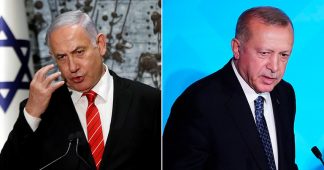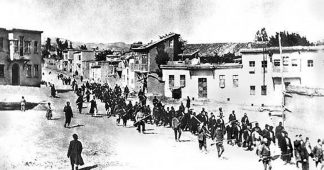US president pays tribute to ‘the lives of all those who died in the Ottoman-era Armenian genocide’; move angers Turkey
Ali Harb, Ragip Soylu
24 April 2021
US President Joe Biden has declared the mass killings of Armenians by Ottoman forces during World War I a genocide in a move that will likely strain the already tense relationship between Washington and Ankara.
The Turkish government was quick to denounce the statement, but it remained calm; it did not announce any retaliatory moves amid cooling relations with Washington.
In a presidential declaration marking the Armenian Genocide Remembrance Day on Saturday, Biden used the word “genocide” to describe the massacre, which took place between 1915 and 1923.
“Each year on this day, we remember the lives of all those who died in the Ottoman-era Armenian genocide and recommit ourselves to preventing such an atrocity from ever again occurring,” Biden said in a statement.
“Beginning on April 24, 1915, with the arrest of Armenian intellectuals and community leaders in Constantinople by Ottoman authorities, one and a half million Armenians were deported, massacred, or marched to their deaths in a campaign of extermination.”
Turkey responds
Turkey, which rejects the label, had warned the US administration against proceeding with the recognition.
Turkish Foreign Minister Mevlut Cavusoglu rebuked the US statement minutes after it was released. “We have nothing to learn from anybody on our own past. Political opportunism is the greatest betrayal to peace and justice,” he wrote on Twitter. “We entirely reject this statement based solely on populism.”
The Turkish Foreign Ministry said it denounces the US president’s declaration in the “strongest terms”.
“It is clear that the said statement does not have a scholarly and legal basis, nor is it supported by any evidence. With regards to the events of 1915, none of the conditions required for the use of the term ‘genocide’ that is strictly defined in international law are met,” the ministry said in a statement.
“The nature of the events of 1915 does not change according to the current political motives of the politicians or domestic political considerations. Such an attitude serves only a vulgar distortion of history.”
Turkish President Tayyip Erdogan sent a letter to Armenian Patriarch Sahak Masalyan earlier on Saturday, rejecting what he called the politicising of historical debates by third parties that do not benefit anyone.
We cannot allow the culture of peaceful co-existence between Turks and Armenians, which lasted for centuries and set an example to all mankind, to be forgotten,” Erdogan said.
“We have expressed, on various occasions, our preparedness to advance our relations with Armenia on the basis of good neighbourly ties and mutual respect.”
US-Turkey relations
Successive US administrations from both major parties have refrained from describing the killings as a genocide.
On Saturday, Biden became the first US president to use the term since Ronald Reagan, who mentioned “the genocide of the Armenians” in a passing reference in 1981.
The US policy shift on genocide recognition comes as the two countries face many thorny issues, including Ankara’s purchase of Russian S-400 air defence systems, which Washington views as a threat to military cooperation within Nato.
Turkey has been a member of Nato since 1952, and it continues to host US nuclear weapons at its Incirlik Air Base.
Turkish-American relations have been plagued with tensions in recent years. Washington has angered Ankara with its military support for Kurdish groups in Syria that Turkey views as a threat to its national security.
Late last year, the US imposed sanctions on Turkey over the S-400 impasse. Turkey had also been ejected from the Nato-led F-35 programme to develop advanced fighter jets.
Ankara had threatened to restrict US access to Incirlik during past spikes in tension, but it did not raise the prospect this time. Nor did it recall its ambassador to the US on Saturday as it did with countries that previously declared the killings a genocide.
Howard Eissenstat, associate professor of Middle East history at St. Lawrence University, said Saturday’s announcement will not rupture ties between Ankara and Washington.
“Turkish-US relations are not particularly strong. I don’t think that this improves them. I don’t think that this fundamentally undermines them,” Eissenstat told MEE.
“In the end, Turkey and the US are going to find places to cooperate, and they’re going to have lots of areas where they’re working at odds with each other.”
issenstat explained that Biden’s declaration does not carry a legal weight.
“This is a presidential statement. It gives solace to the descendants of victims, particularly those in the United States, but outside of that, it doesn’t have any legal standing,” he said.
The killings
An estimated 1.5 million Armenians were killed in Ottoman-controlled territory between 1915 and 1923, the majority before 1919, through systematic deportations, starvation and murder.
Most of the killings took place during the First World War. Turkish forces subsequently fought against allied forces, including France, the UK and Russia, which intended to occupy and partition Anatolia during what Turkey calls the Turkish War of Independence.
The description of the mass killings as “genocide” is a sensitive issue for Turkish leaders.
Turkey acknowledges that atrocities took place against Armenians during the war, but it says the killings were not a part of a systematic campaign and do not amount to genocide. Azerbaijan likewise disputes the term.
However, about 30 countries recognise the genocide, including France, Canada, Brazil, Germany, Russia, Poland and the Netherlands.
Other countries, such as the UK, have condemned the killings, but believe that they do not meet the definition of genocide as defined by the 1948 UN Convention on Genocide.
What is genocide?
The term “genocide” is relatively new. It was coined during World War II by Polish lawyer Raphael Lemkin.
“It consists of the Greek prefix genos, meaning race or tribe, and the Latin suffix cide, meaning killing,” the United Nations says.
“Lemkin developed the term partly in response to the Nazi policies of systematic murder of Jewish people during the Holocaust, but also in response to previous instances in history of targeted actions aimed at the destruction of particular groups of people.”
The UN-backed 1948 Genocide Convention describes genocide as “acts committed with intent to destroy, in whole or in part, a national, ethnical, racial or religious group,” including killing, torture and preventing births.
A 1987 US law that was introduced by Biden himself when he was a senator echoes that definition.
The Merriam-Webster dictionary defines genocide as “the deliberate and systematic destruction of a racial, political, or cultural group”.
Armenians hail declaration
Armenian-American groups and activists that had been pushing for the recognition for decades celebrated the statement from the White House on Saturday.
The Armenian Assembly, an advocacy organisation, lauded the declaration on Saturday, calling it a “watershed moment” in US history and a “signature moment for human rights”.
Sophia Armen, Armenian-American activist and scholar, called the declaration a triumph by and for Armenians.
“This came about because of our efforts, the community, our organisations, that day-in day-out work for this justice even when it is not a trending topic,” Armen told MEE.
“Each generation has taken up the fight, and each generation has fought hard. We know this is not an issue of the past, but one with multiscalar implications for the entire region today.”
Adam Schiff, the Democratic chair of the House Intelligence Committee who has been advocating for the recognition, also hailed the presidential declaration.
“For Armenian Americans and everyone who believes in human rights and the truth, today marks an historic milestone: President Biden has defied Turkish threats and recognized the slaughter of 1.5 million Armenians for what it was – the first genocide of the 20th Century,” Schiff said in a statement.
As a candidate last year, Biden pledged to make the recognition official if elected.
“Like the genocide of the Armenians before it, and the genocide of the Cambodians which followed it – and like too many other such persecutions of too many other peoples – the lessons of the Holocaust must never be forgotten,” Biden said in a statement marking the 2020 Armenian Genocide Remembrance Day.
In 2019, Congress passed a resolution recognising the mass killings as a genocide with overwhelming bipartisan support. Former president Donald Trump refused to sign the recognition.
Published at www.middleeasteye.net











